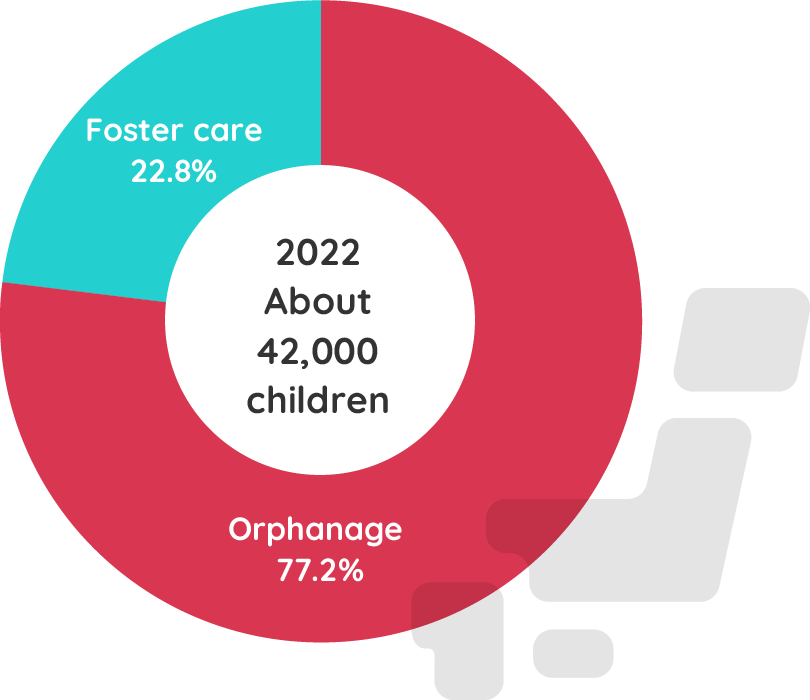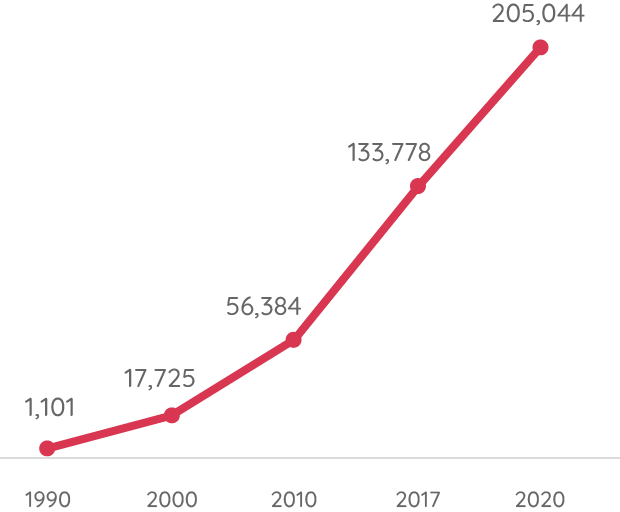Encouragement
We encourage foster families to communicate with each other to support one another as well as to share experiences.
Consultation
We receive calls and e-mails from foster families for consultations.
Did you know that 42,000 children
in Japan were unsafe living with
their birth parents in 2022?
Abuse reports exceeded 205,044 in 2020.
Under these circumstances, there are 42,000 children nationwide every year who cannot live with their birth parents due to various situations, such as abuses, illnesses, criminal activities, economic difficulties, etc.
We are a team of advocates for the well-being of children.
We do not want to lose any more lives of children suffering from abuse.
Our goal is to protect the futures of the children who have been rescued.
We are promoting foster care and adoption for the betterment of children’s welfare.

Support for Foster Parents
Encouragement
We encourage foster families to communicate with each other to support one another as well as to share experiences.
Consultation
We receive calls and e-mails from foster families for consultations.
Support for New Parents
Support
We support both new and expectant mothers who are in difficult environments by providing them with advice as well as necessities such as food and clothing.
Advice
We offer counseling for women going through teen pregnancies to provide a safe place for discussion and receiving advice.

Approximately 36,000 children out of the 42,000 who are not able to live with their birth parents are living in orphanages.

The percentage of foster care in Japan is the lowest among countries in the Organization for Economic Co-operation and Development (OECD). The number of foster parents in Japan is still not yet enough.

Source: Ministry of Health, Labor, and Welfare
“Conditions of social care in Japan in 2021”
The number of abuse reports continues to rise, and one abused child takes their life every week.

The poverty rate of Japanese children is 13.5%(2018). Furthermore, the poverty rate of a single-parent household is 48.1%, which is said to be the worst level among developed countries.
The conditions and quality of care in each orphanage throughout Japan differs considerably. It is important for children to receive individual care, but the low number of staff responsible for nurturing these children prevents them from receiving the full care that they need. The involvement of employees in the orphanage facilities is currently limited, which greatly affects the futures of the children.
Every facility has a large entrance, dining room, and a bathroom. However, depending on the orphanage, a facility varies in living arrangements, from private bedrooms to shared eight-person rooms. It is difficult for the children to consider these orphanages as homes. The Japanese government recommends that the orphanages change their living arrangements from the current situation of placing many children in one large room to placing them in a home-like environment where they are provided individual care. Each facility is working to improve the quality of living in order to provide what is best for the children.
Human Rights Watch (Without Dreams)
No large orphanages such as those in Japan exist in other developed countries. Smaller orphanages are able to professionally nurture the children in an environment similar to a home. Even if there were multiple adults rotating shifts throughout the day to care for one infant so that there would always be a one-to-one interaction, the care would still be insufficient for infants to develop an attachment. The number of staff assigned to one child in Japan is still the lowest among developed countries, and the solution set by the Japanese government was to place the children under institutional care, to which the UN has warned the Japanese government three times to correct and improve its system. The country has improved over the last few years, but the standard for care provided through government funding is still at a ratio of 1 to 1.3, employee to infant. Due to this lack of quality in the standard of care, there are facilities that arrange for more staffing using their own budgets if there needs to be a higher ratio of employees to infant. The Japan Child Support Association, and now also the Japanese government, believe that this insufficiency is able to be solved under a foster care home placement system.
*To move to the payment page in Japanese,
Please select your language from the language translation tool in the upper right corner.
We kindly decline the offers below
・Adopt a Japanese children
・Goods’ donation
・Volunteer for children
To keep supporting Japan’s foster families means to make more children happier. We need funds.I hope you support us with your donation.